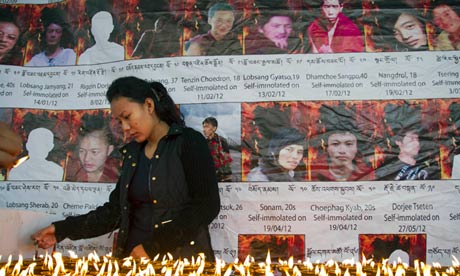
An exiled Tibetan
woman in Dharmsala, India, lights lamps in front of portraits of
Tibetans who have self-immolated.
An 18-year-old Tibetan villager died after setting himself on fire in northwest China
in the latest of a half-dozen such self-immolations reported during the
past week as the country's communist leadership undergoes a
once-a-decade transfer of power.
A short report from the state-run Xinhua News Agency did not offer a reason why the man self-immolated, but dozens of ethnic Tibetans have set themselves on fire in heavily Tibetan regions over more than a year and a half to protest Chinese rule.
Overseas groups that report on most of the self-immolations had said at least five ethnic Tibetans set themselves on fire earlier in the week in protests aimed as a signal to the Communist Party elite as they meet in Beijing in a pivotal, weeklong congress that opened on Thursday.
On Friday, hundreds of Tibetans, mostly high school students, demonstrated in a town that sits at the edge of the Tibetan plateau in western Qinghai province, calling for Tibetan independence and the return from exile of their spiritual leader, the Dalai Lama.
Saturday's immolation took place in the afternoon in front of a monastery in the city of Hezuo in the Tibetan autonomous prefecture of Gannan, Xinhua said, citing provincial government sources.
The man has been identified as Gonpo Tsering from the city's Lexiu township and further investigations are under way, Xinhua said.
Overseas activist groups had no immediate information on Saturday's incident, and police in Hezuo declined to comment. Calls to Hezuo's city government and to authorities and police in Gannan prefecture rang unanswered Sunday.
In Beijing on Friday, Tibetan Communist Party officials attending the party congress told reporters they believed much of the blame for the spate of self-immolations fell on the Dalai Lama and his associates, whom they said were instigating the protests.
"The external Tibetan forces and the Dalai clique are sacrificing other people's lives to attain their secret political motives," Lobsang Gyaincain, the Chinese-appointed vice governor of Tibet, told reporters.
The Dalai Lama has said he opposes all violence and says the self-immolations are a symptom of the desperation and frustration felt by Tibetans living under the Chinese government's hardline policies in the region, including its tight restrictions on religious life.
A short report from the state-run Xinhua News Agency did not offer a reason why the man self-immolated, but dozens of ethnic Tibetans have set themselves on fire in heavily Tibetan regions over more than a year and a half to protest Chinese rule.
Overseas groups that report on most of the self-immolations had said at least five ethnic Tibetans set themselves on fire earlier in the week in protests aimed as a signal to the Communist Party elite as they meet in Beijing in a pivotal, weeklong congress that opened on Thursday.
On Friday, hundreds of Tibetans, mostly high school students, demonstrated in a town that sits at the edge of the Tibetan plateau in western Qinghai province, calling for Tibetan independence and the return from exile of their spiritual leader, the Dalai Lama.
Saturday's immolation took place in the afternoon in front of a monastery in the city of Hezuo in the Tibetan autonomous prefecture of Gannan, Xinhua said, citing provincial government sources.
The man has been identified as Gonpo Tsering from the city's Lexiu township and further investigations are under way, Xinhua said.
Overseas activist groups had no immediate information on Saturday's incident, and police in Hezuo declined to comment. Calls to Hezuo's city government and to authorities and police in Gannan prefecture rang unanswered Sunday.
In Beijing on Friday, Tibetan Communist Party officials attending the party congress told reporters they believed much of the blame for the spate of self-immolations fell on the Dalai Lama and his associates, whom they said were instigating the protests.
"The external Tibetan forces and the Dalai clique are sacrificing other people's lives to attain their secret political motives," Lobsang Gyaincain, the Chinese-appointed vice governor of Tibet, told reporters.
The Dalai Lama has said he opposes all violence and says the self-immolations are a symptom of the desperation and frustration felt by Tibetans living under the Chinese government's hardline policies in the region, including its tight restrictions on religious life.
No comments:
Post a Comment